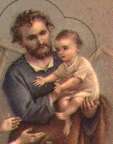|
__________________________________________________________________
 Saints Saints
Luke 6:20-31,
Mat. 5:1-12, Hebrews 11:29-12:2
by Rev. Frank Schaefer
When we think of All Saints Day, we often
think of canonized saints; Christian heroes and heroines, that are no
longer with us--good people, but dead people.
We tend to "canonize" our loved ones who died. The longer they’ve been
dead, the better person they seem to have been. Perhaps this is also the
reason why many of our elders speak so highly of the past ("Back when .
. .in the olden days, . . . " Even in church historical terms, when we
talk about the past, we often refer to it as some sort of "golden age,"
no matter how dreary it may actually have been.
The interesting thing is that while we tend to reserve the expression
"saint" to the ones who went before us and are no longer with us, Paul
actually addresses the Christians at Corinth as "saints" (1Cor.
1:2--"agiois" Greek equivalent to the Latin "sanctus" the root for
"saint").
And let us be clear on this: he did not do so because they were a
congregation full of mother Teresas and Billy Grahams. Every time I read
Paul’s letter to the Corinthians, I say (with relief): "and I thought WE
had problems!" The church at Corinth would have been kicked out of any
denomination a long time ago; the services were chaotic, there were
false teachings, cliques, divisions, adultery, the list goes on.
Well, if Paul calls the Corinthians saints, it can only be because of
their potential to become saints--their calling. And that’s actually how
the NRSV translates it: "called to be saints, together with all those
who in every place call on the name of our Lord Jesus Christ . . ."
Did you just hear that? Are we in a place where we call on the Lord
Jesus Christ?" Yes, we are. If you are calling on that name in this
place or in any place, I got news for you: you too are a saint--a saint
in training maybe, but still some sort of saint!
So, how is a “living saint” to live? What are the characteristics of a
saint?
When we consider, both our Matthew passage and our Hebrews epistle
reading we learn that the saints who lived before us did not have easy
lives. In fact they often had to muster up an extraordinary faith in
difficult circumstances.
Whoever said being a Christian is easy? It’s not. It’s not for the faint
in heart. Jesus never promised his followers an easy life.
Nowhere does it say in the Bible that once we surrender our lives to God
that everything will be a ok. In fact, Jesus said that the student will
not be greater than the teacher. But “blessed are those who are
persecuted for righteousness' sake, for theirs is the kingdom of
heaven.”
So its not so much that we Christians are spared from life’s struggles
than that God expects us to demonstrate extraordinary faith in our
struggle with life--illness, losses, heart aches, family problems and so
on.
Blessed are you when you show faith in extreme situation, when you
demonstrate meekness when confronted, when you do the right thing even
thought it’s against the grain, when you keep a merciful attitude, when
you make every effort to make peace, and so on.
And the author of Hebrews gives us a long list of examples of how
believers before us have been faithful in extreme circumstances.
Reading these passages, the question that comes to my mind is: How can
we ever live up to Jesus’ job description of a saint; how could we ever
have the faith of a Joshua, Rahab, or of Stephen the martyr? [continue]
|